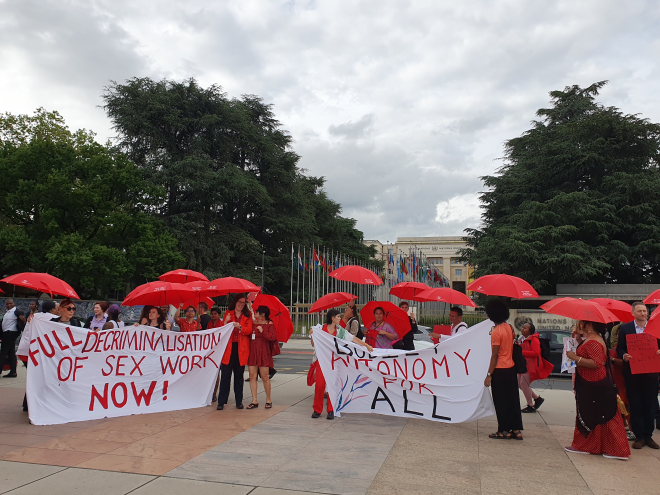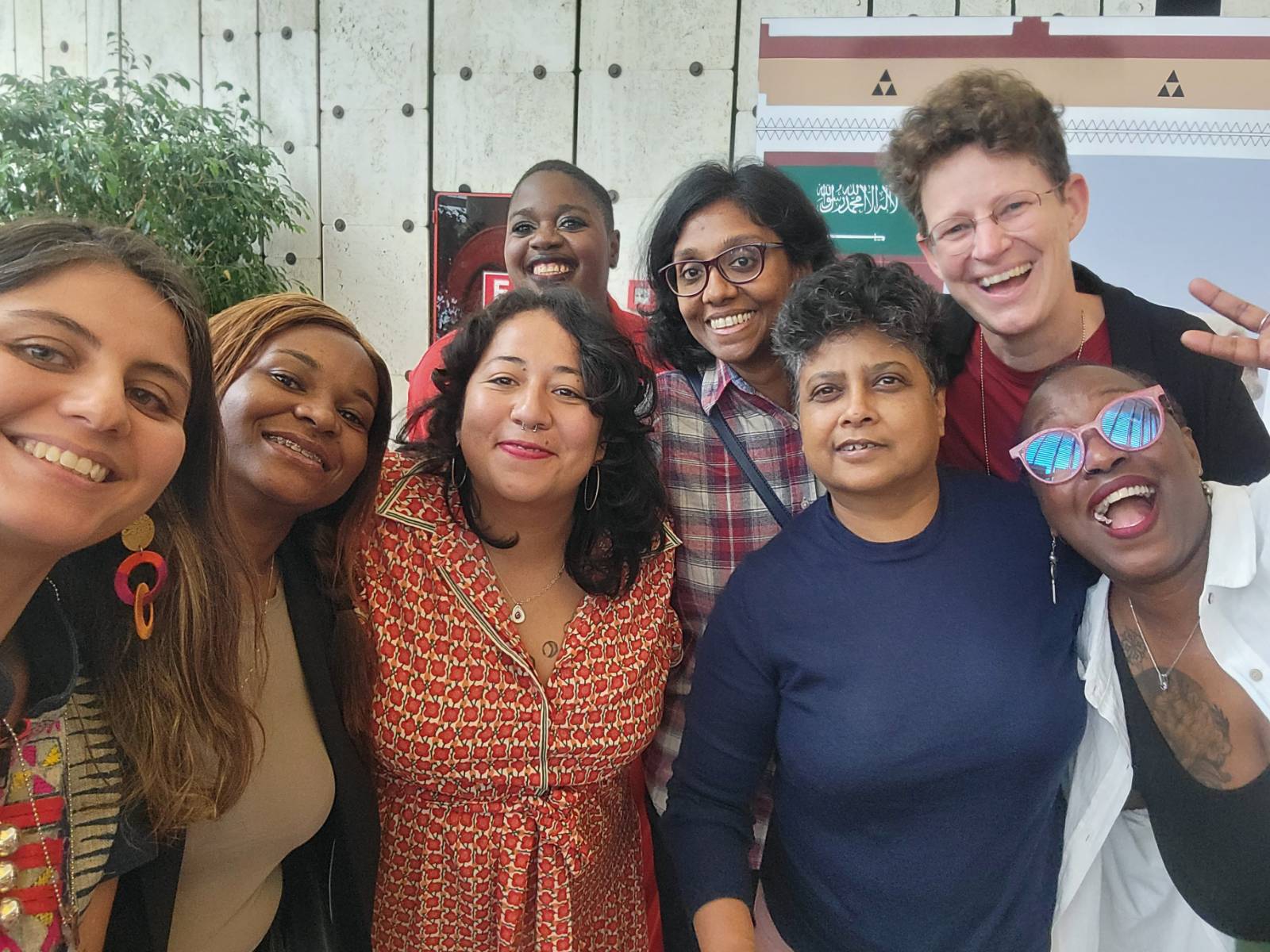27-06-2024Tuesday 18 June 2024 – An HRC First-Timer
"Your grounds pass to the UN in Geneva has been approved”. A great message to receive after a lengthy red-tape roller-coaster-in-slow-motion of logins, old fashioned signed letters, uploads, designates and e-mails. And it comes just on time, as I’m already on my way there by train. The train got delayed at Schiphol and I’m crossing my fingers and hoping I can still make my transfer in Paris to Geneva. That’s where I’ll be attending the 56th Human Rights Council (HRC56). My first HRC.
I’m part of a delegation of Our Voices Our Futures (OVOF) consortium in which we collaborate with the India-based feminist human rights organization
CREA, East African community-led grantmaker UHAI-EASHRI, feminist tech colleagues at the Association for Progressive Communications (
APC) and the Mesoamerican women human rights defenders (WHRDs) network
IM-Defensoras. OVOF is supporting sex workers’ rights activists from Bangladesh, India, Kenya, Lebanon and Uganda to attend and engage. To be heard at the UN.
The UN continues to be in a financial crisis (liquidity crisis) as Member States – read the USA –
haven’t paid their dues. I experienced this during the UN Commission on the Status of Women (CSW) in New York in March when the negotiations between governments had to stop strictly by 6 pm as the building literally closed, reducing electricity, interpretation and security personnel costs. I’m told that for the HRC this means there are fewer staff available, among others in the UN NGO Bureau supporting civil society engagement, fewer side events with interpretation, and the electricity bill is lowered by keeping the air-conditioning off. Airy clothes it is.
Wednesday 19 June 2024 – Sex Workers Rights Defenders Unite
I just found out that this is the very first time that an international sex workers delegation is jointly attending the HRC in Geneva! There were supposed to be over 20 activists here but due to visa obstacles several sex workers from Africa, the MENA region and Asia are missing. Still, it is significant to have sex worker representatives from 6 different continents here together.
There is high importance to sex workers engaging in this HRC. The UN Special Rapporteur on Violence Against Women and Girls, Reem Alsalem, will be presenting her latest report on ‘prostitution and violence against women and girls’. She was outspoken against sex workers’ rights before starting this research, and she clearly has maintained this frame, completely discarding ample available evidence to the contrary, in her report. Thankfully many of the inputs – full of academic evidence, arguments, policy reviews and lived experience – have been gathered by the Count Me In! (CMI!) consortium
here.
During a preparatory meeting organized by
NSWP and
SRI and attended by WO=MEN and several of our members and other allied organisations, sex workers share their responses to the report of the Special Rapporteur, highlighting a very different reality from the portrayal by the Special Rapporteur and speaking from the heart. A shared sentiment: "this report is a violence against us”.
"This Special Rapporteur is totally ignoring our lives, our work. There is importance in the term ‘sex worker’. It explicitly makes the connection with human and labour rights. It is an umbrella term which includes diverse sectors and is gender and sexuality inclusive. Do not erase our consent by talking about ‘prostituted women’,” shares one of the participants.
Thursday 20 June 2024 – Finding my way in the HRC
While other delegates focus on bilateral meetings with mission and UN staff, I explore the HRC process. More experienced peers point me to the vending machines which, surprisingly, have better tasting coffee than the cantina and I find hidden sockets to charge my laptop.
During the 30th anniversary session of the mandate of the Special Rapporteur on Violence against Women and girls, former rapporteurs provide context to the priorities and achievements during their mandate. "The geopolitical context of the 90s was different from now. It was just after the Cold War. There was consensus in the Security Council. There was a positive outlook,” shares Radhika Coomaraswamy. Rapporteurs highlighted addressing root causes of violence against women, mentioning patriarchy, culture, economic independence, the need to strengthen due diligence and accountability of the State and listening to the voices of those often excluded. One of the rapporteurs recalls having moved from a victimization to an empowerment approach, "where women can escape from violence and speak up.” I interpret this as a respectful critique of the current Rapporteur who prefers the term victim.
I attend a side event about Sudan, "One year on: Accountability for Violations in the Devastating Sudan Conflict”. In the OVOF partnership Sudan is one of the focus countries, selected as such before the current fighting started. It is extremely difficult for civil society to organize in the country or for journalists to report on it. Sudan is also my country of birth and it hurts to see only a few government have shown up. Statements from women in Sudan, experiencing conflict related sexual violence are shared: "We are not okay. We are not safe. We need the international community to pay attention to the suffering we face. We are victimized again and again… Is there any country that cares about us?”.
Friday 21 June 2024 – Ready for Decrim
I started my day with sitting in on ‘informals’ (negotiations between governments) about a draft resolution on elimination of all forms of discrimination against women and girls. At the CSW in New York such sessions are nowadays closed to civil society, one of those possibly accidental closing space examples that is hard to get overturned. It turned out to be a good preparation for the afternoon’s session, as governments shared opposing views on whether to use the term prostitution or sex work or sex or gender.
The presentation itself of the report on prostitution and violence against women and girls by the Special Rapporteur takes place in the afternoon in the main room with the colorful ceiling. The small ngo-observation area is packed with sex workers rights defenders and allies. It hurts to see the reality and rights of people who do sex work so blatantly denied in this important human rights space. Seeing extremely conservative States talk about the integrity of women and claiming all sorts of action and policies in place to protect women from violence.
It hurts, but it also harms. Criminalisation and stigma result in discrimination and more violence against and killing of sex workers. Poorer health outcomes. Denial of basic financial services like a bank account. Lack of access to legal services. Abuse by authorities like the police, including theft and rape. Children being denied an education. Loss of custody of your own children. Homelessness.
But we also quietly clap (you are not allowed to make a peep in the ngo section) for a number of States who highlight that it’s important to use the term ‘sex work’ instead of ‘prostituted women’. That they feel many voices were not included in the report. That sex work and trafficking should not be conflated. That the legal model recommended by the Special Rapporteur leads– see ample evidence from Sweden, Ireland, France - to poor health and rights outcomes for women in the sex industry. The most notable highlights, some of which are shared on Monday when the session is continued, come from the ‘usual suspects’ the Netherlands, Belgium and New Zealand but also Chile, Panama, Mexico, South Africa, Greece, Austria, Switzerland, and Luxembourg impress. WHO even asks governments to consider their submission next to the report, as it does not seem to have been included in the analysis presented by the Rapporteur. Many of the submissions – although strangely not all of them – have just bene published by the Rapporteur
here.
We end the day and week 1 of the 56th Human Rights Council with a powerful protest in front of the UN where sex workers and allies gather under red umbrella’s and carry "Bodily autonomy for all” and "Full decriminalization of sex work NOW!” banners. When Reem Alsalem, the Special Rapporteur herself, is visually confronted by the protest while waiting for a green light to cross the street the chanting strengthens: "We are ready, we are ready, we are ready for decrim”.
Monday 24 June 2024 – Sex workers can speak for themselves: "Not rescue, but rights”
The
oral statements by governments in response to the new report by the Special Rapporteur on Violence against Women and Girls are continued, ending with ten ngo statements. Sex workers from Africa, Latin America and Europe take the microphone and call for decriminalization of sex work, the recognition of sex work as work and acknowledgement of sex workers as people with agency.
"
My work is as dignified as any other work. But we do endure undignified conditions because of the lack of recognition of our work. Although it is true that not everyone wants to be a sex worker, it is also true that not everyone wants to be a secretary or do housekeeping. Our decisions are as valid as those who decide not to do sex work. I will continue to demand my rights as a sex worker because I also deserve labor rights,” says Carolina, a sex worker and mother from Colombia.
The Dutch lgbt organisation COC is the last to make a statement, highlighting that lgbt and sex worker movements represent overlapping communities and have shared struggles for their right to self-determination and bodily autonomy.
In the afternoon, WO=MEN is one of the (many!) co-sponsors of a side event organised by NSWP and SRI on the decriminalization of sex work as human rights imperative. I am relieved to see the room filling up quickly, including with numerous state delegates who are easily recognized with their printed country signs. The panellists provide clarity about different legal and policy frameworks and their implications for sex workers. They bust some myths (no, decriminalisation does not undermine anti-trafficking efforts, quite the contrary) and share insights from strategies used to strengthen their rights. In South Africa, a bill to decriminalise sex work is still pending in parliament. In Kenya, a public interest litigation process has been prepared following a large number of murders of sex workers. New Zealand and the Netherlands take the floor during the Q&A, commending the panellists for their courage to speak out.
Despite the publication of a very harmful report by this particular Special Rapporteur, it was a good day. Sex workers and allies – across movements and sectors – came together and spoke out against the harms and injustice, and for human rights for all. Including people who do sex work.

